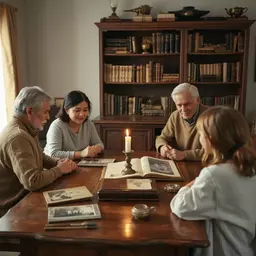Creative Writing Tips for Seniors
As we age, our life experiences become a rich tapestry of stories waiting to be shared. Have you ever considered how creative writing could not only reflect your journey but also connect you with others? Discover the transformative power of creative writing in later life and how it can enhance your well-being.
What You Will Learn
- Mental Agility: Writing regularly stimulates the brain, enhancing memory and critical thinking skills.
- Emotional Outlet: Creative writing serves as a powerful means to express and process emotions, reducing stress and anxiety.
- Strengthening Bonds: Sharing personal stories fosters social connections and nurtures a sense of community among peers.
- Legacy Creation: Writing allows individuals to document and share their life stories, leaving a cherished legacy for future generations.
- Finding Inspiration: Life experiences, both joyful and challenging, provide rich material for storytelling that resonates with readers.
- Practical Writing Techniques: Establishing a writing routine and setting achievable goals can ignite creativity and boost confidence in your writing journey.
- Overcoming Writer's Block: Simple strategies, such as free writing or connecting with fellow writers, can help you reignite your passion for storytelling.
The Impact of Creative Writing on Older Adults
Explore the significant benefits of creative writing for older adults, focusing on cognitive health, emotional well-being, and social connections.
Cognitive Health
Writing sharpens analytical skills and encourages critical thinking.
Emotional Well-Being
Expressing thoughts and feelings through writing can improve mood and reduce feelings of isolation.
Social Connections
Sharing stories with others fosters relationships and nurtures community bonds.
Legacy Building
Sharing your stories creates a living legacy that can be cherished by family and friends.
Discovering the Joy of Creative Writing in Later Life
As we age, the beauty of life experiences often becomes the tapestry from which we weave our stories. At Legacy Writers Guild, we believe that embracing creative writing in later life not only nurtures the soul but also opens up a world of opportunities for self-discovery and connection. Imagine sitting down with a cup of tea, pen in hand, ready to explore the pages of your unique journey. How wonderful would it be to share those tales with others?
Creative writing is not just a hobby; it's a powerful tool for mental agility, emotional expression, and building social connections. Engaging in this art form allows older adults to reflect on their lives and share wisdom accumulated over the years. Can you think of a time when your thoughts flowed freely onto the paper, revealing insights you never knew existed?
Understanding the Importance of Creative Writing for Older Adults
Creative writing plays a significant role in enhancing the quality of life for older adults. Studies suggest that writing can improve cognitive health, emotional well-being, and social interaction, all of which contribute to a fulfilling life. By expressing thoughts and feelings through writing, seniors can experience a sense of purpose and accomplishment. For more insights on how daily life can be a source of inspiration, check out Creative Writing for Seniors: Everyday Life as Your Inspiration.
- Mental Agility: Regular writing stimulates the brain, improving memory and critical thinking skills.
- Emotional Expression: Writing serves as an outlet for emotions, helping to alleviate stress and anxiety.
- Social Connections: Sharing stories with others fosters relationships and nurtures community bonds.
In our workshops at Legacy Writers Guild, we witness firsthand how creative writing fosters connections among participants. It's heartwarming to see individuals finding common ground through their stories, creating new friendships along the way!
Benefits of Engaging in Creative Writing Activities
The benefits of creative writing extend far beyond just putting words on a page. Engaging in writing activities can enhance cognitive health, boost emotional well-being, and facilitate legacy building. One of the most fulfilling aspects of writing is the ability to leave a lasting legacy, sharing your narratives with future generations. Delve deeper into the positive effects of creative writing exercises on the mind by exploring The Power of Creative Writing Exercises for Senior Minds.
- Cognitive Health: Writing sharpens analytical skills and encourages critical thinking.
- Emotional Well-Being: Expressing thoughts and feelings through writing can improve mood and reduce feelings of isolation.
- Legacy Building: Sharing your stories creates a living legacy that can be cherished by family and friends.
Every time I see a participant in our Legacy Writers Guild workshops find their voice, it reminds me of the profound impact creative writing can have on an individual’s life. It's a beautiful journey of self-exploration!
Life Experience as a Source of Inspiration
Our lived experiences are rich tapestries filled with stories waiting to be told. Every moment, from joyous celebrations to challenging times, can serve as inspiration for your writing. By tapping into personal experiences, you can enrich your storytelling and connect with readers on a profound level. Consider how Poetry for Senior Citizens can also be a powerful way to express these life experiences.
- Memorable Moments: Reflect on pivotal life events that shaped who you are today.
- Lessons Learned: Consider the wisdom gained from challenges and triumphs.
- Stories of Others: Draw inspiration from the lives of family, friends, or historical figures.
At Legacy Writers Guild, we encourage writers to share their individual journeys. Each story is unique, and our goal is to help you articulate those moments that resonate deeply within you. After all, isn’t that what storytelling is all about?
Practical Techniques to Enhance Creative Writing Skills
Now that we recognize the joy in writing, let's dive into some practical techniques to enhance your skills. Regardless of your writing background, there are various exercises that can help stimulate creativity and build confidence.
Pro Tip
Did you know? Setting aside just 10 minutes each day for creative writing can significantly enhance your skills over time. Whether you jot down thoughts, draft a poem, or outline a story, consistency is key to unlocking your creative potential!
Encouraging Action and Continued Engagement in Writing
As we embark on our writing journeys, it’s vital to create a rhythm that fosters creativity. At the Legacy Writers Guild, I believe that establishing a writing routine can spark inspiration and nurture your passion for storytelling. Whether it’s early in the morning with a cup of tea or late at night under the soft glow of a lamp, find a time that works for you and stick to it.
Additionally, setting achievable goals can keep your motivation high. Start small—perhaps aim for a few sentences a day and gradually increase your target as you feel more comfortable. Writing is a personal journey, and it’s important to celebrate your progress, no matter how small!
Actionable Steps to Start Your Creative Writing Journey
- Identify a consistent time each day dedicated to writing.
- Set specific, measurable goals (like writing 300 words a day).
- Create a cozy writing space filled with inspiring objects.
- Keep a notebook handy for spontaneous ideas or snippets of dialogue.
- Join online writing groups to share your work and gain feedback.
These simple steps can help you find your voice and hold onto it. Remember, it’s all about enjoying the process of expressing yourself!
Resources and Tools for Senior Writers
To make writing easier and more enjoyable, I’ve gathered a list of tools and resources that can support your journey. These resources can spark creativity and provide guidance along the way. Also be sure to check out our post on how taking writing courses for seniors can be extremely beneficial.
- Writing Prompts: Utilize sites like Writer's Digest or Reedsy for engaging prompts.
- Writing Apps: Consider apps like Scrivener for organization or Evernote for note-taking.
- Community Centers: Look for local libraries or senior centers that offer writing workshops.
- Online Classes: Websites like Coursera and MasterClass provide courses on various writing styles.
These resources can be game-changers, whether you're writing memoirs or crafting fictional tales. Explore them at your own pace, and don’t hesitate to experiment!
Strategies for Overcoming Writer's Block
Writer's block can feel like a heavy weight holding us back. However, there are practical strategies to help you break free! Allow yourself to remember that creativity is a journey filled with ups and downs.
- Take a short walk in nature to refresh your mind and spark new ideas.
- Practice free writing for 10-15 minutes without worrying about grammar or structure.
- Read snippets of your favorite books to ignite inspiration.
- Try writing prompts that challenge you to think outside the box.
- Connect with fellow writers for encouragement and fresh perspectives.
These techniques can help you shift your mindset and reignite your passion for writing. Remember, at the Legacy Writers Guild, we’re all about supporting each other through the creative process!
Frequently Asked Questions About Creative Writing in Later Life
- Q: How does creative writing benefit cognitive health in older adults?
- A: Regular creative writing stimulates the brain, improving memory, critical thinking skills, and overall mental agility.
- Q: Can creative writing help with emotional well-being?
- A: Yes, creative writing serves as a powerful outlet for expressing and processing emotions, which can reduce stress, anxiety, and feelings of isolation.
- Q: How can sharing personal stories foster social connections?
- A: Sharing personal stories creates common ground, allowing individuals to connect with others, build new friendships, and strengthen community bonds.
- Q: What is "legacy building" through writing?
- A: Legacy building refers to the process of documenting and sharing your life stories, experiences, and wisdom through writing, leaving a cherished heritage for future generations.
- Q: What are some practical ways to start a creative writing routine?
- A: Practical steps include identifying a consistent time for writing each day, setting achievable goals (e.g., 300 words a day), creating an inspiring writing space, and keeping a notebook for spontaneous ideas.
- Q: How can I overcome writer's block?
- A: Strategies to overcome writer's block include taking short walks, practicing free writing (writing without worrying about grammar), reading for inspiration, using writing prompts, and connecting with other writers.
Conclusion: The Lasting Impact of Creative Writing
Writing is not just a hobby; it can be a powerful tool for reflection, healing, and growth. By embracing creative expression in our later years, we unlock the potential to leave behind a legacy that resonates with future generations.
Reflecting on the Benefits of Creative Expression in Later Life
As you reflect on your writing journey, consider how it has enriched your life. What have you learned about yourself? How have your stories helped you connect with others? The answers may surprise you!
Inviting Readers to Share Their Experiences
Finally, I encourage you to connect with others and share your writing achievements. Your stories can inspire someone else to embark on their own creative journey! Let’s build a community of writers who celebrate the beauty of personal narratives and the power of shared experiences.
At the Legacy Writers Guild, we’re excited to hear your stories, so don’t hesitate to reach out and share your journey with us. Let’s keep the spirit of storytelling alive and thriving!
Recap of Key Points
Here is a quick recap of the important points discussed in the article:
- Mental Agility: Engaging in creative writing improves cognitive health by stimulating the brain.
- Emotional Expression: Writing serves as a therapeutic outlet for emotions, reducing stress and anxiety.
- Social Connections: Sharing stories fosters relationships and builds community bonds.
- Legacy Building: Writing allows you to create and share narratives that can be cherished by future generations.
- Practical Techniques: Establish a writing routine, set achievable goals, and create a cozy writing space to enhance creativity.
- Overcoming Writer's Block: Utilize strategies like free writing, nature walks, and reading to reignite your passion for writing.






